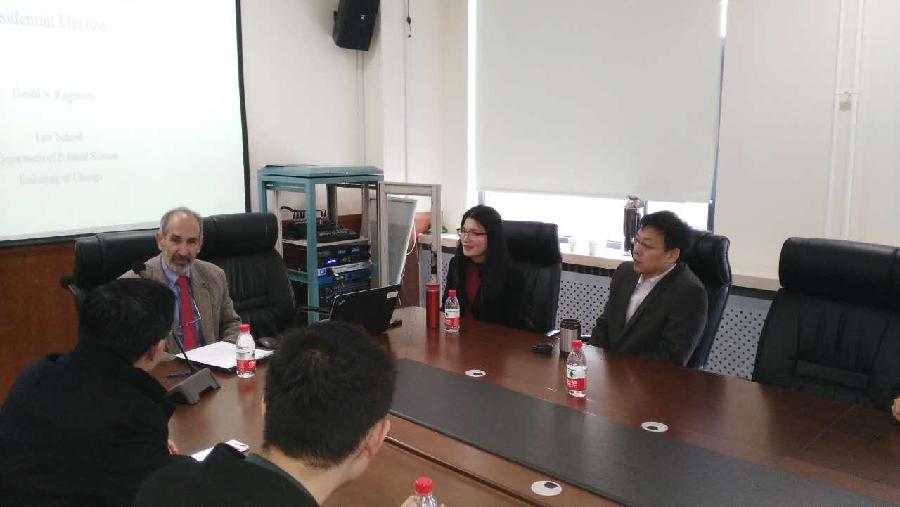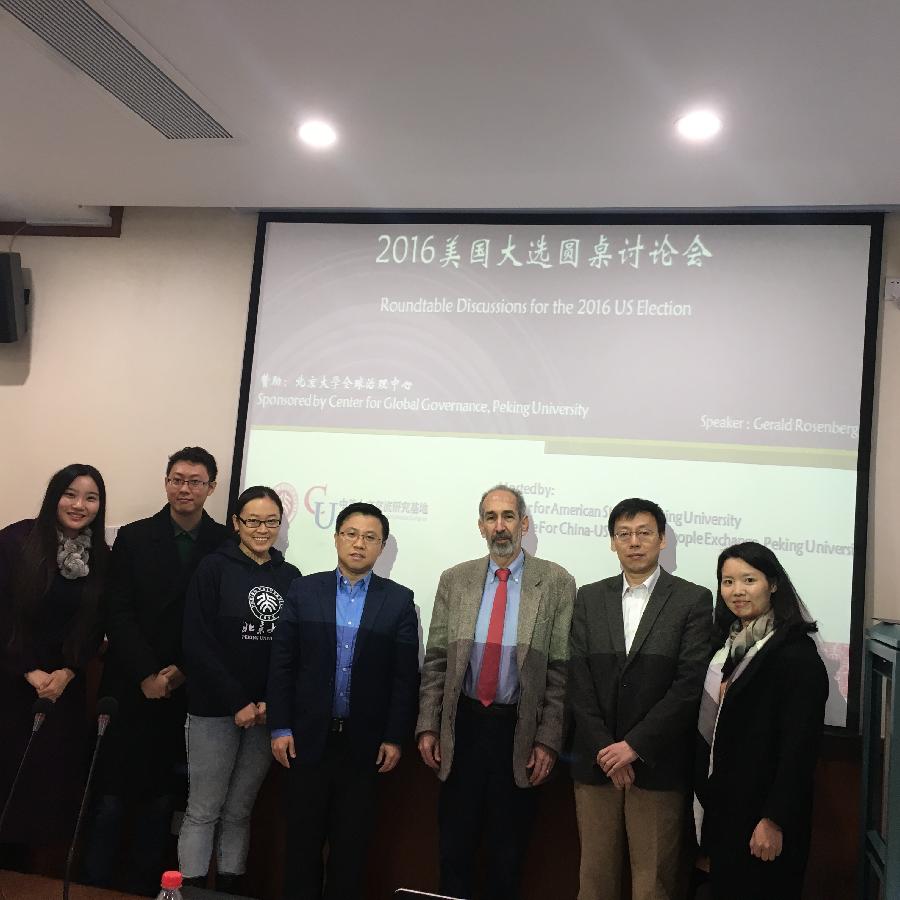On the morning of November 5, Gerald N. Rosenberg, an Associate Professor of the Department of Political Science at the University of Chicago Law School, held a round-table seminar with teachers and students at the School of International Studies of Peking University on the fourth day of the countdown to the 2016 American Presidential Election. The event was jointly organised by the Institute for China-US People-to-People Exchange and American Studies Centre of Peking University.

As the FBI reopened the investigation of Hillary Clinton's email scandal, Hillary lost her leading superiority. The two presidential candidates clung to each other, swinging between one and two points. The situation became confusing; who would become the host of the White House? What do you think of Hillary and Trump's ideas and styles of governance? What will happen to China-U.S. relations? To this end, the American Studies Centre and Institute for China-US People-to-People Exchange of Peking University jointly hosted this round-table seminar. Presided over by Wang Dong, Professor of the School of International Studies and Executive Deputy Director of the Institute for China-US People-to-People Exchange of Peking University, it was attended by Fan Shiming, Vice Dean of the School of International Studies of Peking University, Chen Jing, Associate Researcher of Chinese Academy of International Trade and Economic Cooperation, Gong Ting, Assistant Researcher of the China Institute of International Studies, Wang Zheng, Associate Researcher of the American Studies Centre of Hunan Academy of Social Sciences, and more than 20 students. Associate Professor Rosenberg first gave a detailed report on the 2016 American Presidential Election. Associate Professor Rosenberg, who has deeply studied the rule of law, social movement and big society, tracked the party primary elections and competitive election, and analyzed mainstream media reports and polls. He pointed out that the 2016 American Presidential Election was full of stories and twists to an extent unprecedented in more than 200 years of American history. However, media viewed the election as a "horse race" , focusing on who lost and won, and on the unusual scandals rather than on the candidates' policies and ideas, which was very disappointing. The speech by Associate Professor Rosenberg developed in three aspects: the American primary election system; status of the candidates; and who is likely to be elected. As for the primary election system, Associate Professor Rosenberg pointed out that America's general election system is anti-democratic: low voter turnout, greater influence of money, electoral college system, greater influence of big states and the battle for swing states. This American Presidential Election was actually a battle among 6 or 7 swing states, and the public opinions of the other states were difficult to reflect. Associate Professor Rosenberg analyzed in detail the strengths and weaknesses of Trump and Hillary. Trump is the most unpopular presidential candidate in the history of the American Presidential Election, followed by Hillary. Trump, a political "outsider", makes bizarre comments, including refusing to acknowledge the outcome of the election if he lost; while Hillary is mired in the e-mail scandal. Trump's strengths are as follows: more than half of Americans are dissatisfied with the state of the country and want changes, and Trump can pander to the angry and discontent; white working-class Americans are loyal followers of Trump; Trump's approval rating among whites is high; and Americans generally do not want the same party to be elected three times in a row. Hillary's strengths are as follows: former Secretary of State, rich experience in administration; high approval rating in her own party; and high approval rating from ethnic minorities and women. Associate Professor Rosenberg predicted that Hillary will win the election. In the final week, the FBI dropped the bombshell that they will reopen the investigation into the e-mail scandal, but the basic result is settled. Unless there is a major change, it will be difficult to tip the scales. Of course, this possibility was not ruled out, but it is very unlikely. Associate Professor Rosenberg said that he is willing to support Hillary because he is terrified by Trump's uncertainty and refusal to play by the rules.
Next, Associate Professor Rosenberg carried out in-depth discussions with the teachers and students attending the seminar on the credibility of public opinion polls, battle for swing states, polarisation of the American Republican Party, how to bridge the social divergence if Hillary is elected, and the influence on China-U.S. relations if Trump is elected. The round-table conference lasted two hours, and the whole discussion was thorough and productive, helping the participants to understand the American Presidential Election.

Gerald N. Rosenberg: Associate Professor of Political Science at the University of Chicago Law School, once taught at Yale University and the National Law School of India University. His main research fields include the interaction between different courts, social movement and big society. As a member of the Washington State Bar Association, he has published articles in the University of Chicago Law Review, Virginia Law Review, NOMOS, Supreme Court Review and other law reviews and journals. Associate Professor Rosenberg has edited a number of books and writtenThe Hollow Hope: Can Courts Bring About Social Change?and textbooks on the American government. He was awarded the Quantrell Awards for Excellence in Undergraduate Teaching, Gordon J. Laing Prize of University of Chicago Press, American Political Science Association Teaching and Guidance Award, and Wordsworth Award.
